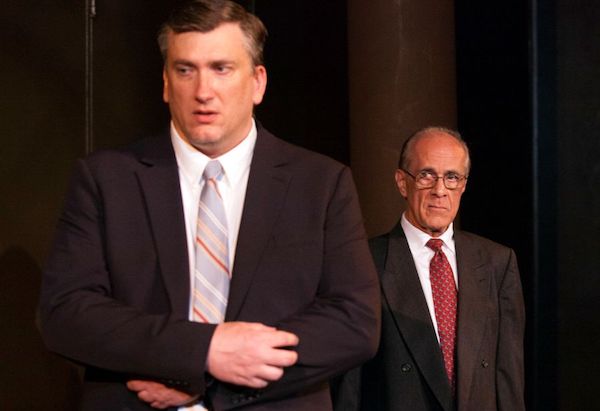
'A Walk in the Woods' takes a quiet, more personal look at nuclear proliferation and the future of humanity
By Tina Farmer
The West End Player's Guild opens their 107th season with Lee Blessing's A Walk in the Woods. The deceptively straightforward play, which premiered in 1988, introduces audiences to Andrey Bottvinnik, a Russian negotiator, and his newly appointed American counterpart, John Honeyman. The two men meet in Geneva, Switzerland over many months in an attempt to come to terms on a nuclear arms treaty that each will then present to their government's leadership. The story unfolds in a woody area where the two men walk, talk, and take refuge from the press.
The two bicker over matters large and small as they work to craft an agreement in a process layered with bureaucracy and stubborn tradition. The intentionally measured pace of the show reminds us of the high stakes behind the gamesmanship, the purposeful manipulation and political maneuvering. The setting in the woods reminds us of the essential humanity of Bottvinnik and Honeyman. They may work for opposing governments, but they are simply two men facing the Herculean task of preventing global nuclear obliteration.
Tom Moore, and Tim Naegelin are well cast and each man comports himself with appropriate gravitas in his role. Moore's Bottvinnik is slight, impeccably dressed, and a bit weary after years spent repeating the same process with little forward progress. He expresses himself in big ideas and small, particular movements, and has a humorous fondness for quality. Naegelin's Honeyman is new to the position and eager to prove himself despite his lack of experience. He is serious and on task, determined to succeed where others have failed, and it's surprising when he's finally pressed to the point of losing his patience. His posture is upright, often stiff, and he often looks like he'd rather be somewhere else, somewhere more industrious. Bottvinnik is less interested in hammering out details, his familiarity with the process providing him the benefit of knowing the likely outcome before his first meeting with Honeyman.
Director Renee Sevier-Monsey guides the show with purpose and clear intention, and the actors turn in strong performances. Jacob Winslow's set is gorgeous, transforming the basement theater into a secluded wooded spot not too far, but away from the fluorescent lights, negotiating tables, and reporters. The setting suits the conversational, character driven nature of the script and is complemented by the simple but effective light and sound design. I do wish that the costumer or stage manager would give Honeyman a handkerchief of some sort, as the lights and his layered costume add to the warmth in the room causing a bit of sweat at times.
The problem with the show is that it's almost too personal, and too real. The reality of the situation, the tedious back-and-forth that never ends, belies the serious nature of the work. The men eventually soften and lose some of their initial formality, but they don't fundamentally change. It becomes easy for audience members to tune out for a bit -- perhaps missing some well-crafted and subtly pointed dialogue that should spur us to demand action. Bottvinnik may be too comfortable with a sword hanging over his head; Honeyman may be too focused on the sword. There's tension here, but without any urgency the story languishes, has nowhere to go. That of course, may be the point.
A show this cerebral, focused on the intricate workings of government, is almost too easy to overlook. There's a lovely back and forth to the conversation that belies the serious nature of the men's task, and while traditional dramatic action is scarce, it is impossible to forget that these two men are working to prevent the destruction of our planet. A Walk in the Woods, running through October 8, ultimately proves worthy of our attention, though it struggles at times to hold it. The West End Players' Guild production focuses on character while dramatizing serious commentary on nuclear proliferation and war. In today's political climate, the script seems disturbingly prescient and timely, with relevant themes and sharply pointed dialogue that could be lifted from the headlines.


